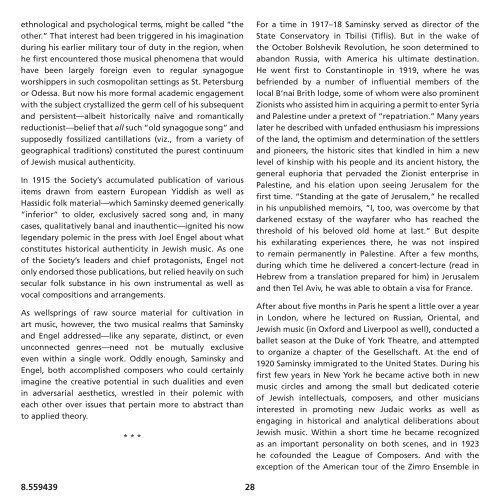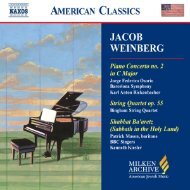Download Liner Notes PDF - Milken Archive of Jewish Music
Download Liner Notes PDF - Milken Archive of Jewish Music
Download Liner Notes PDF - Milken Archive of Jewish Music
You also want an ePaper? Increase the reach of your titles
YUMPU automatically turns print PDFs into web optimized ePapers that Google loves.
ethnological and psychological terms, might be called “theother.” That interest had been triggered in his imaginationduring his earlier military tour <strong>of</strong> duty in the region, whenhe first encountered those musical phenomena that wouldhave been largely foreign even to regular synagogueworshippers in such cosmopolitan settings as St. Petersburgor Odessa. But now his more formal academic engagementwith the subject crystallized the germ cell <strong>of</strong> his subsequentand persistent—albeit historically naïve and romanticallyreductionist—belief that all such “old synagogue song” andsupposedly fossilized cantillations (viz., from a variety <strong>of</strong>geographical traditions) constituted the purest continuum<strong>of</strong> <strong>Jewish</strong> musical authenticity.In 1915 the Society’s accumulated publication <strong>of</strong> variousitems drawn from eastern European Yiddish as well asHassidic folk material—which Saminsky deemed generically“inferior” to older, exclusively sacred song and, in manycases, qualitatively banal and inauthentic—ignited his nowlegendary polemic in the press with Joel Engel about whatconstitutes historical authenticity in <strong>Jewish</strong> music. As one<strong>of</strong> the Society’s leaders and chief protagonists, Engel notonly endorsed those publications, but relied heavily on suchsecular folk substance in his own instrumental as well asvocal compositions and arrangements.As wellsprings <strong>of</strong> raw source material for cultivation inart music, however, the two musical realms that Saminskyand Engel addressed—like any separate, distinct, or evenunconnected genres—need not be mutually exclusiveeven within a single work. Oddly enough, Saminsky andEngel, both accomplished composers who could certainlyimagine the creative potential in such dualities and evenin adversarial aesthetics, wrestled in their polemic witheach other over issues that pertain more to abstract thanto applied theory.* * *For a time in 1917–18 Saminsky served as director <strong>of</strong> theState Conservatory in Tbilisi (Tiflis). But in the wake <strong>of</strong>the October Bolshevik Revolution, he soon determined toabandon Russia, with America his ultimate destination.He went first to Constantinople in 1919, where he wasbefriended by a number <strong>of</strong> influential members <strong>of</strong> thelocal B’nai Brith lodge, some <strong>of</strong> whom were also prominentZionists who assisted him in acquiring a permit to enter Syriaand Palestine under a pretext <strong>of</strong> “repatriation.” Many yearslater he described with unfaded enthusiasm his impressions<strong>of</strong> the land, the optimism and determination <strong>of</strong> the settlersand pioneers, the historic sites that kindled in him a newlevel <strong>of</strong> kinship with his people and its ancient history, thegeneral euphoria that pervaded the Zionist enterprise inPalestine, and his elation upon seeing Jerusalem for thefirst time. “Standing at the gate <strong>of</strong> Jerusalem,” he recalledin his unpublished memoirs, “I, too, was overcome by thatdarkened ecstasy <strong>of</strong> the wayfarer who has reached thethreshold <strong>of</strong> his beloved old home at last.” But despitehis exhilarating experiences there, he was not inspiredto remain permanently in Palestine. After a few months,during which time he delivered a concert-lecture (read inHebrew from a translation prepared for him) in Jerusalemand then Tel Aviv, he was able to obtain a visa for France.After about five months in Paris he spent a little over a yearin London, where he lectured on Russian, Oriental, and<strong>Jewish</strong> music (in Oxford and Liverpool as well), conducted aballet season at the Duke <strong>of</strong> York Theatre, and attemptedto organize a chapter <strong>of</strong> the Gesellschaft. At the end <strong>of</strong>1920 Saminsky immigrated to the United States. During hisfirst few years in New York he became active both in newmusic circles and among the small but dedicated coterie<strong>of</strong> <strong>Jewish</strong> intellectuals, composers, and other musiciansinterested in promoting new Judaic works as well asengaging in historical and analytical deliberations about<strong>Jewish</strong> music. Within a short time he became recognizedas an important personality on both scenes, and in 1923he c<strong>of</strong>ounded the League <strong>of</strong> Composers. And with theexception <strong>of</strong> the American tour <strong>of</strong> the Zimro Ensemble in8.559439 28
















